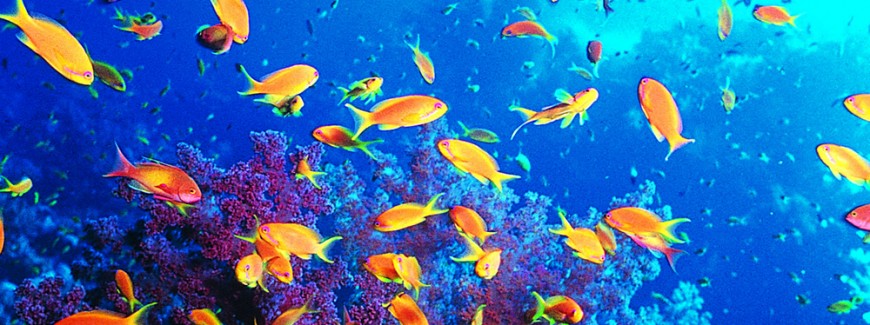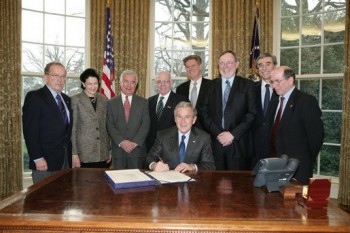Upholding a Legacy of Success
Factsheet: An Overview of the Magnuson-Stevens Fishery Conservation and Management Act [PDF]
From its beginnings in 1976 and through its past two reauthorizations in 1996 and 2006, Congress has consistently amended and strengthened the Magnuson-Stevens Fishery Conservation and Management Act (Magnuson-Stevens Act) to conserve and sustain U.S. marine fisheries, the people and communities that rely upon them, and our strong national fishing traditions.
More than a decade ago, Congress passed and President George W. Bush signed the Magnuson-Stevens Fishery Conservation and Management Reauthorization Act of 2006 into law with the goal of improving upon the ongoing efforts to restore America’s fisheries and coastal fishing communities to a state of healthy and productive resilience. The legislation mandated scientifically derived annual catch limits and accountability measures to end overfishing and to rebuild overfished and depleted populations. In addition, it built upon the 1996 measures to minimize bycatch of untargeted species and reduce fish habitat damage in our waters.
Rebuilding fish stocks brings significant economic benefits to our nation
- The U.S. commercial industry landed 8.4 billion pounds of seafood in 2020, valued at $4.8 billion.
- In NOAA’s most recent Fisheries Economics of the United States report, commercial and recreational fisheries generated approximately 1.8 million jobs in the U.S. and more than $372 billion in sales impacts.
Today, the National Marine Fisheries Service’s (NMFS) Fish Stock Sustainability Index shows we are making steady progress in restoring the health of U.S. fisheries due in great part to Congress’ leadership during the last two reauthorizations of the Magnuson-Stevens Act.
While the health of many of our fisheries has been steadily recovering under the mandates of the Magnuson-Stevens Act, some fisheries have still not reached their full potential. In New England, the Gulf of Mexico, and other regions, certain fish populations have been slow to rebound, in many cases because of persistent overfishing exacerbated by infrequent assessments and data limitations. Bycatch, or the catching, discarding, and potentially killing of non-targeted species, remains a problem that affects the productivity and, in some cases, the recovery of fisheries in many regions. Additionally, our oceans and fisheries are facing emerging new challenges. Climate change is causing geographical shifts in fish populations, while higher absorption of carbon is increasing the acidity of our oceans – placing many wild fisheries in jeopardy. Furthermore, shrinking federal budgets are limiting the resources we have to meet and overcome the challenges our fisheries and our oceans are facing.
A study in the Proceedings in the National Academy of Sciences found that strong management has a positive effect on the health of fish stocks. Regions with well-managed fisheries have twice the abundance compared to regions with fisheries that are managed less intensely.
American fisheries are a public resource and need to be managed under the consistent laws and policies of the country. The Magnuson-Stevens Act has a proven track record for improving the long-term health and viability of our nation’s marine ecosystems and coastal fishing communities. With the Magnuson-Stevens Act once again up for reauthorization, we urge Congress to continue its tradition of bipartisan support for this law and preserve its legacy of success. The Marine Fish Conservation Network believes that we must continue to sustain and improve our federal fisheries policy to ensure that all Americans can benefit from productive fisheries and healthy and resilient marine ecosystems for generations to come.
Overall Goals
To hold the course toward achieving healthy fisheries, the Network will continue to defend and work to strengthen the Magnuson-Stevens Act in order to promote and conserve healthy marine ecosystems, habitats, fish populations, and the fishing communities that depend upon them.
Marine Fish Conservation Network Priorities for Reauthorization
- Maintain and defend the Magnuson-Stevens Act’s conservation requirements and strong science-based management, including the law’s rebuilding provisions and its requirements for annual catch limits and accountability measures to ensure that overfishing does not occur. This also includes supporting mandates for full compliance with all federal laws and regulations such as the National Environmental Policy Act (NEPA) and the Endangered Species Act (ESA).
- Promote policies that support and strengthen our nation’s working waterfronts and community-based fishermen, including improving fishing community access opportunities and other community safeguards.
- Transition to a more comprehensive fisheries management system that protects marine ecosystems, including stronger fish habitat protections and forage species management and conservation. This also includes measures to minimize bycatch and better incorporate fisheries and ecosystem science.
- Strengthen assessment, monitoring, and enforcement mechanisms for implementing the law, through improvements to stock assessments and catch accounting, and timelier implementation of electronic monitoring.
Implementing policies to meet these goals will continue the job of restoring U.S. fisheries and oceans and help them withstand emerging challenges of the future. The Network looks forward to working with Congress to uphold and strengthen the Magnuson-Stevens Act for the benefit of fishermen, coastal communities, and all Americans who enjoy and rely on thriving and productive oceans.
The Magnuson-Stevens Act: A Bipartisan Tradition
Through the past two reauthorizations of the Magnuson-Stevens Fishery Conservation and Management Act in 1996 and 2006, Republicans and Democrats have agreed that conserving America’s oceans and fish populations make good economic and environmental sense. With the Magnuson-Stevens Act now up for reauthorization, Congress should continue this tradition of bipartisan support for our primary federal fisheries law and preserve its legacy of success.
Since Congress incorporated scientific mandates and strengthened the conservation measures in this law in 1996, two-thirds of overfished stocks have been rebuilt or are making improvements. According to NOAA Fisheries, rebuilding all U.S. fish populations would lead to a $31 billion increase in annual sales and support half a million new U.S. jobs.
“This landmark legislation was originally sponsored by several great friends of Alaska — Senator Magnuson, our own Senator Ted Stevens, and Senator Inouye — and co-sponsored by several Republican and Democratic members of the Committee. It represented a truly bipartisan effort to carefully manage one of America’s greatest assets, our fisheries.”
Sen. Mark Begich (D-AK), 2011



